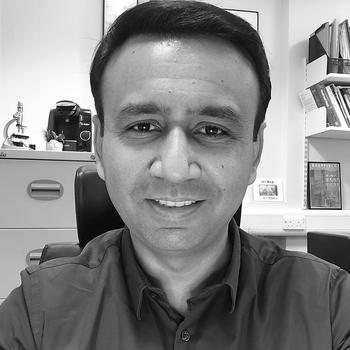December 2022 podcast with Professor Ali Khurram

In our final episodes for 2022, podcast host Natasha Cutmore speaks with Sheffield-based Professor and Consultant in Oral and Maxillofacial Pathology, Professor Ali Khurram. He has had an unusual and interesting career which started with studying Dentistry in Pakistan, before moving to the UK for his academic and clinical training in Pathology, culminating in a FRCPath in Oral and Maxillofacial Pathology in 2016.
Ali is the Clinical Lead for his Specialty in Sheffield and Training Programme Director (Oral and Maxillofacial Pathology) for Yorkshire and the Humber. He is actively involved in teaching and training at local, regional, national and international level and also leads a research group (NEOPATH) focussed on research on head and neck cancers. Ali is the Secretary of the British Society for Oral and Maxillofacial Pathology, the Webmaster/Digital Adviser for the Pathological Society of Great Britain and Ireland and a Patron for The Swallows Head and Neck Cancer Charity.
Ali has also led the development of a digital teaching platform called ‘Pathogenesis’. In recognition of his contributions to oral pathology teaching, he has been awarded the 2022 PathSoc Golden Microscope Award.
Part one: Professor Ali Khurrum's life and career
In this episode, we find out about Ali’s career in oral and maxillofacial pathology, which has taken him from Pakistan to the UK. The discipline of Oral and Maxillofacial Pathology is a clinical specialty, undertaken by laboratory-based dentists. It is a branch of histopathology and, in common with medical histopathologists, oral and maxillofacial pathologists provide reports based on interpretation of tissue biopsies of varying types and of surgical resection material.
Part two: The past, present and future of oral and maxillofacial pathology
In this episode, we chat to Ali about the past, present and future of oral and maxillofacial pathology and head and neck cancer. Find out how oral and maxillofacial pathology became a pathology specialty and about the exciting tools that will be helping pathologists diagnose and treat head and neck cancer patients in the future.
